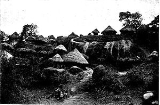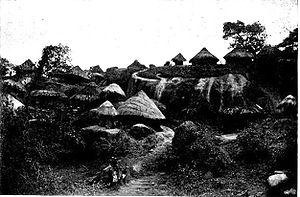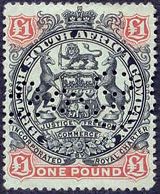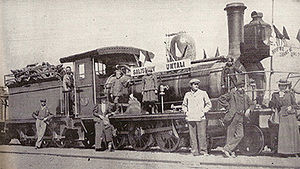
Early history of European settlement in Zimbabwe
Encyclopedia
The early history of European settlement in Zimbabwe, range from the arrival of the Portuguese to the establishment of the colony of Southern Rhodesia
in 1923.
arrived, destroyed Mutapa's trade with Swahili
merchants and began a series of wars which left the empire so weakened that it was near collapse in the early 17th century. Several Kalanga communities came together to form the Rozwi Empire
, which covered more than half of present day Zimbabwe. By 1690 they forced the Portuguese off the plateau and the Rozwi controlled much of the land formerly under Mwene Mutapa.
With relative peace and prosperity for the next two centuries, the Kalanga
centres of Dlodlo, Khami
, and Great Zimbabwe reached their peaks. As a result of the mid-19th century turmoil in Transvaal
and Natal, the Rozwi Empire
came to an end. Ndebele peoples migrating from the Mfecane
came to the Kalanga
Rozwi Empire and made war with it. They conquered it and assimilated the inhabitants.
 The British entered Matabeleland in the 1880s, under the leadership of Cecil Rhodes, who extracted mining rights from King Lobengula of the Ndebele. He sent John Moffat
The British entered Matabeleland in the 1880s, under the leadership of Cecil Rhodes, who extracted mining rights from King Lobengula of the Ndebele. He sent John Moffat
, son of the missionary Robert Moffat
, who was trusted by Lobengula, to persuade the latter to sign a treaty of friendship with Britain. Moffat persuaded Lobengula to look favourably on Rhodes' proposals carried by his agent Charles Rudd
. Rudd assured Lobengula that no more than ten white men would mine in Matabeleland, but left this stipulation out of the document which Lobengula signed, the Rudd Concession
. It stated that the mining companies could do anything necessary to their operations. When Lobengula discovered later what the concession really declared, he tried to renounce it, but the British Government ignored him.
Rhodes used the concession to persuade the British government to grant a royal charter to his British South Africa Company (BSAC) over Matabeleland
and its subject states, such as Mashonaland
. Through such concessions and treaties, many of which were similarly deceitful, he promoted the colonization of the region's land, labor, and precious metal and mineral resources. In 1895 the BSAC adopted the name 'Rhodesia' for Zambesia and in 1898 'Southern Rhodesia
' was officially adopted for the part south of the Zambezi River, which later became Zimbabwe.
The Rudd Concession was a first step towards occupation of good land, but Lobengula's Ndebele were too strong for a direct invasion. Rhodes planned to surround Matebeleland with British-controlled lands, as British Bechuanaland was already established in the west. To the east was Mashonaland
, and as the Shona
were at the time subjects of Lobengula, they were covered by the Rudd Concession.
In 1890 Rhodes used this fact to justify sending the Pioneer Column
of white settlers, protected by well-armed British South Africa Police
(BSAP), the BSAC's own paramilitary force. Rhodes said they hoped to start a "new Rand
" from the ancient gold mines of Mashonaland. The gold had been largely depleted, and the settlers became farmers. Rhodes declared that Lobengula had never really conquered the Shona, so he proclaimed Mashonaland as independent of Matabeland, exploiting tribal rivalries to cement the British settlers' occupation.
Rhodes provoked the neighbouring Ndebele into war, and the BSAP defeated them in the First Matabele War
(1893-94). Lobengula won the battle of the Shangani Patrol
but he died while fleeing north; with the Ndebele defeat, immigration of more Europeans increased greatly. John Moffat belatedly realised that he had been used by Rhodes and opposed the war. The British government suspected that Rhodes knew that the gold was depleted and that Rhodes' primary aim was to settle Mashonaland and Matabeleland all along. After that and the Jameson Raid
on the Transvaal
, they did not trust him to the same extent.
Soon after the Jameson Raid, the Ndebele and Shona rose up in rebellion against the encroachment on their native lands by white settlers, a struggle known in Zimbabwe as the First Chimurenga
. Europeans called it the Second Matabele War
(1896-97). The BSAP defeated them again. The American scout Frederick Russell Burnham
killed Mlimo, the Ndebele leader of the rebellion. Soon after Rhodes entered unarmed into the Ndebele stronghold in Matobo Hills and persuaded the impi
to lay down their arms, effectively ending the Second Matabele War. The Ndebele and Shona became subject to the Rhodes administration, which led to the land distribution favouring whites and displacing Shona, Ndebele and other Black African people. Land holdings in Zimbabwe continue to be a controversial issue.

 From 1894 the colony's executive branch was run by the BSAC's administrator
From 1894 the colony's executive branch was run by the BSAC's administrator
. The Southern Rhodesia Order in Council created a quasi-legislature called the Southern Rhodesia Legislative Council. Elections were held in 1899, 1902, 1905, 1908, 1911, 1914 and 1920.
There was a gradual de-facto transition from complete rule by the British South Africa Company
to self government by the white settlers. By 1903 the Southern Rhodesia Legislative Council consisted of seven officials of the British South Africa Company and seven elected settlers. In 1907 and later the settlers had the majority of the seats. By the outbreak of the First World War, settlers had formed the Campaign for Responsible Government (later the Responsible Government Association) under Charles Coghlan, who became Rhodesia's first Prime Minister.
In 1918, the BSAC cut back on expenditure and public services such as the mail system, which worsened its popularity among settlers. Agitation continued to grow for self rule independent of any private corporation. The Legislative Council election of 1920 resulted in a majority who favored immediate moves towards establishing 'Responsible Government' within the colony. Immediately after the election, the Legislative Council passed a resolution requesting the United Kingdom government to inaugurate responsible government. The UK established a Commission under Earl Buxton, a former Liberal minister. The Commission reported in 1921 that the Colony was ready for responsible government and that a referendum
should be held to confirm it. On October 27, 1922 a referendum was held to determine whether the colony should join the Union of South Africa or establish self-government. The self-government camp won the referendum by a wide margin.
Southern Rhodesia
Southern Rhodesia was the name of the British colony situated north of the Limpopo River and the Union of South Africa. From its independence in 1965 until its extinction in 1980, it was known as Rhodesia...
in 1923.
Portuguese and the Rozwi Empire
In the early 16th century AD the PortuguesePortugal
Portugal , officially the Portuguese Republic is a country situated in southwestern Europe on the Iberian Peninsula. Portugal is the westernmost country of Europe, and is bordered by the Atlantic Ocean to the West and South and by Spain to the North and East. The Atlantic archipelagos of the...
arrived, destroyed Mutapa's trade with Swahili
Swahili people
The Swahili people are a Bantu ethnic group and culture found in East Africa, mainly in the coastal regions and the islands of Kenya, Tanzania and north Mozambique. According to JoshuaProject, the Swahili number in at around 1,328,000. The name Swahili is derived from the Arabic word Sawahil,...
merchants and began a series of wars which left the empire so weakened that it was near collapse in the early 17th century. Several Kalanga communities came together to form the Rozwi Empire
Rozwi Empire
The Rozwi Empire or Lozwi Empire was established on the Zimbabwean Plateau by Changamire Dombo.-History:In 1693, Portuguese militia tried to take control of the gold trade in the interior of sub-saharan Africa by invading the Rozwi empire...
, which covered more than half of present day Zimbabwe. By 1690 they forced the Portuguese off the plateau and the Rozwi controlled much of the land formerly under Mwene Mutapa.
With relative peace and prosperity for the next two centuries, the Kalanga
Kalanga
Kalanga may refer to:* BaKalanga people* Kalanga language* Kalanga, Togo...
centres of Dlodlo, Khami
Khami
Khami is a ruined city located in what is now Zimbabwe. It was once the capital of the Kingdom of Butua of the Torwa dynasty. It is located 22 kilometers west of the modern city of Bulawayo, capital of the province of Matabeleland North. Its ruins are now a national monument in Zimbabwe. Khami is...
, and Great Zimbabwe reached their peaks. As a result of the mid-19th century turmoil in Transvaal
South African Republic
The South African Republic , often informally known as the Transvaal Republic, was an independent Boer-ruled country in Southern Africa during the second half of the 19th century. Not to be confused with the present-day Republic of South Africa, it occupied the area later known as the South African...
and Natal, the Rozwi Empire
Rozwi Empire
The Rozwi Empire or Lozwi Empire was established on the Zimbabwean Plateau by Changamire Dombo.-History:In 1693, Portuguese militia tried to take control of the gold trade in the interior of sub-saharan Africa by invading the Rozwi empire...
came to an end. Ndebele peoples migrating from the Mfecane
Mfecane
Mfecane , also known by the Sesotho name Difaqane or Lifaqane, was a period of widespread chaos and warfare among indigenous tribes in southern Africa during the period between 1815 to about 1840....
came to the Kalanga
Kalanga
Kalanga may refer to:* BaKalanga people* Kalanga language* Kalanga, Togo...
Rozwi Empire and made war with it. They conquered it and assimilated the inhabitants.
British settlement

John Smith Moffat
Reverend John Smith Moffat was a British missionary and imperial agent in southern Africa, the son of missionary Robert Moffat and brother-in-law of missionary explorer David Livingstone....
, son of the missionary Robert Moffat
Robert Moffat
Robert Moffat was a Scottish Congregationalist missionary to Africa, and father in law of David Livingstone....
, who was trusted by Lobengula, to persuade the latter to sign a treaty of friendship with Britain. Moffat persuaded Lobengula to look favourably on Rhodes' proposals carried by his agent Charles Rudd
Charles Rudd
Charles Dunell Rudd was the main business associate of Cecil John Rhodes.Rudd studied at Harrow School and then entered Trinity College, Cambridge in 1863, where he excelled in playing rackets...
. Rudd assured Lobengula that no more than ten white men would mine in Matabeleland, but left this stipulation out of the document which Lobengula signed, the Rudd Concession
Rudd Concession
The Rudd Concession was a written mining concession or agreement that Charles Rudd secured from Lobengula, King of Matabeleland on 13 October 1888. Rudd was a business associate of Cecil John Rhodes and he obtained the concession as his agent....
. It stated that the mining companies could do anything necessary to their operations. When Lobengula discovered later what the concession really declared, he tried to renounce it, but the British Government ignored him.
Rhodes used the concession to persuade the British government to grant a royal charter to his British South Africa Company (BSAC) over Matabeleland
Matabeleland
Modern day Matabeleland is a region in Zimbabwe divided into three provinces: Matabeleland North, Bulawayo and Matabeleland South. These provinces are in the west and south-west of Zimbabwe, between the Limpopo and Zambezi rivers. The region is named after its inhabitants, the Ndebele people...
and its subject states, such as Mashonaland
Mashonaland
Mashonaland is a region in northern Zimbabwe. It is the home of the Shona people.Currently, Mashonaland is divided into three provinces, with a total population of about 3 million:* Mashonaland West* Mashonaland Central* Mashonaland East...
. Through such concessions and treaties, many of which were similarly deceitful, he promoted the colonization of the region's land, labor, and precious metal and mineral resources. In 1895 the BSAC adopted the name 'Rhodesia' for Zambesia and in 1898 'Southern Rhodesia
Southern Rhodesia
Southern Rhodesia was the name of the British colony situated north of the Limpopo River and the Union of South Africa. From its independence in 1965 until its extinction in 1980, it was known as Rhodesia...
' was officially adopted for the part south of the Zambezi River, which later became Zimbabwe.
The Rudd Concession was a first step towards occupation of good land, but Lobengula's Ndebele were too strong for a direct invasion. Rhodes planned to surround Matebeleland with British-controlled lands, as British Bechuanaland was already established in the west. To the east was Mashonaland
Mashonaland
Mashonaland is a region in northern Zimbabwe. It is the home of the Shona people.Currently, Mashonaland is divided into three provinces, with a total population of about 3 million:* Mashonaland West* Mashonaland Central* Mashonaland East...
, and as the Shona
Shona people
Shona is the name collectively given to two groups of people in the east and southwest of Zimbabwe, north eastern Botswana and southern Mozambique.-Shona Regional Classification:...
were at the time subjects of Lobengula, they were covered by the Rudd Concession.
In 1890 Rhodes used this fact to justify sending the Pioneer Column
Pioneer Column
The Pioneer Column was a force raised by Cecil Rhodes and his British South Africa Company in 1890 and used in his efforts to annex the territory of Mashonaland, later part of Southern Rhodesia ....
of white settlers, protected by well-armed British South Africa Police
British South Africa Police
The British South Africa Police was the police force of the British South Africa Company of Cecil Rhodes which became the national police force of Southern Rhodesia and its successor after 1965, Rhodesia...
(BSAP), the BSAC's own paramilitary force. Rhodes said they hoped to start a "new Rand
Witwatersrand
The Witwatersrand is a low, sedimentary range of hills, at an elevation of 1700–1800 metres above sea-level, which runs in an east-west direction through Gauteng in South Africa. The word in Afrikaans means "the ridge of white waters". Geologically it is complex, but the principal formations...
" from the ancient gold mines of Mashonaland. The gold had been largely depleted, and the settlers became farmers. Rhodes declared that Lobengula had never really conquered the Shona, so he proclaimed Mashonaland as independent of Matabeland, exploiting tribal rivalries to cement the British settlers' occupation.
Rhodes provoked the neighbouring Ndebele into war, and the BSAP defeated them in the First Matabele War
First Matabele War
The First Matabele War was fought in 1893-1894 between the British South Africa Company military forces and the Ndebele people. Lobengula, king of the Ndebele, avoided outright war with the British settlers because he and his advisors were mindful of the destructive power of the European weapons...
(1893-94). Lobengula won the battle of the Shangani Patrol
Shangani Patrol
The Shangani Patrol was a group of white Rhodesian pioneer police officers killed in battle on the Shangani River in Matabeleland in 1893. The incident achieved a lasting, prominent place in Rhodesian colonial history.-Setting and Battle:...
but he died while fleeing north; with the Ndebele defeat, immigration of more Europeans increased greatly. John Moffat belatedly realised that he had been used by Rhodes and opposed the war. The British government suspected that Rhodes knew that the gold was depleted and that Rhodes' primary aim was to settle Mashonaland and Matabeleland all along. After that and the Jameson Raid
Jameson Raid
The Jameson Raid was a botched raid on Paul Kruger's Transvaal Republic carried out by a British colonial statesman Leander Starr Jameson and his Rhodesian and Bechuanaland policemen over the New Year weekend of 1895–96...
on the Transvaal
South African Republic
The South African Republic , often informally known as the Transvaal Republic, was an independent Boer-ruled country in Southern Africa during the second half of the 19th century. Not to be confused with the present-day Republic of South Africa, it occupied the area later known as the South African...
, they did not trust him to the same extent.
Soon after the Jameson Raid, the Ndebele and Shona rose up in rebellion against the encroachment on their native lands by white settlers, a struggle known in Zimbabwe as the First Chimurenga
Chimurenga
Chimurenga is a Shona word for 'revolutionary struggle'. The word's modern interpretation has been extended to describe a struggle for human rights, political dignity and social justice, specifically used for the African insurrections against British colonial rule 1896–1897 and the guerrilla war...
. Europeans called it the Second Matabele War
Second Matabele War
The Second Matabele War, also known as the Matabeleland Rebellion and in Zimbabwe as the First Chimurenga, was fought in 1896–97 between the British troops and the Ndebele people....
(1896-97). The BSAP defeated them again. The American scout Frederick Russell Burnham
Frederick Russell Burnham
Frederick Russell Burnham, DSO was an American scout and world traveling adventurer known for his service to the British Army in colonial Africa and for teaching woodcraft to Robert Baden-Powell, thus becoming one of the inspirations for the founding of the international Scouting Movement.Burnham...
killed Mlimo, the Ndebele leader of the rebellion. Soon after Rhodes entered unarmed into the Ndebele stronghold in Matobo Hills and persuaded the impi
Impi
An Impi is an isiZulu word for any armed body of men. However, in English it is often used to refer to a Zulu regiment, which is called an ibutho in Zulu. Its beginnings lie far back in historic tribal warfare customs, where groups of armed men called impis battled...
to lay down their arms, effectively ending the Second Matabele War. The Ndebele and Shona became subject to the Rhodes administration, which led to the land distribution favouring whites and displacing Shona, Ndebele and other Black African people. Land holdings in Zimbabwe continue to be a controversial issue.
Rule by the British South Africa Company and Legislative Council


Administrator of Southern Rhodesia
The Administrator of Southern Rhodesia was a post within the British Empire which existed from 1890 to 1923 at the time when Southern Rhodesia was governed by the British South Africa Company...
. The Southern Rhodesia Order in Council created a quasi-legislature called the Southern Rhodesia Legislative Council. Elections were held in 1899, 1902, 1905, 1908, 1911, 1914 and 1920.
There was a gradual de-facto transition from complete rule by the British South Africa Company
British South Africa Company
The British South Africa Company was established by Cecil Rhodes through the amalgamation of the Central Search Association and the Exploring Company Ltd., receiving a royal charter in 1889...
to self government by the white settlers. By 1903 the Southern Rhodesia Legislative Council consisted of seven officials of the British South Africa Company and seven elected settlers. In 1907 and later the settlers had the majority of the seats. By the outbreak of the First World War, settlers had formed the Campaign for Responsible Government (later the Responsible Government Association) under Charles Coghlan, who became Rhodesia's first Prime Minister.
In 1918, the BSAC cut back on expenditure and public services such as the mail system, which worsened its popularity among settlers. Agitation continued to grow for self rule independent of any private corporation. The Legislative Council election of 1920 resulted in a majority who favored immediate moves towards establishing 'Responsible Government' within the colony. Immediately after the election, the Legislative Council passed a resolution requesting the United Kingdom government to inaugurate responsible government. The UK established a Commission under Earl Buxton, a former Liberal minister. The Commission reported in 1921 that the Colony was ready for responsible government and that a referendum
Referendum
A referendum is a direct vote in which an entire electorate is asked to either accept or reject a particular proposal. This may result in the adoption of a new constitution, a constitutional amendment, a law, the recall of an elected official or simply a specific government policy. It is a form of...
should be held to confirm it. On October 27, 1922 a referendum was held to determine whether the colony should join the Union of South Africa or establish self-government. The self-government camp won the referendum by a wide margin.

